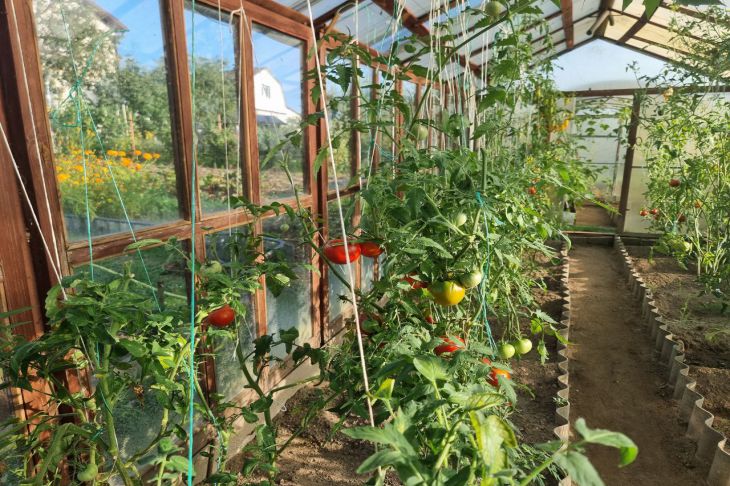What should not be put in the hole when planting tomatoes: practical experience of summer residents
Many gardeners, trying to improve the conditions for plant growth, add various fertilizers and top dressings to the holes. However, not all of them are useful, and some can even be harmful.
Let's look at what you shouldn't put in the hole when planting tomatoes, based on the practical experience of summer residents and their reviews.
Fresh manure
Fresh manure is one of the most common misconceptions among beginning gardeners. It would seem that this natural fertilizer should be beneficial, but in fact it can burn the roots of plants.
Why not?
Fresh manure contains a high concentration of ammonia and actively releases heat during decomposition, which leads to burns of the root system. In addition, it can become a source of pathogenic bacteria and fungi.

Reviews from summer residents:
"Once I put fresh cow manure in a hole, thinking that the tomatoes would grow like crazy. As a result, the plants turned yellow and began to wilt. Not all of them were saved." (Olga, a summer resident with 5 years of experience)
"Fresh manure is a mistake I will never make again. It is better to use rotted compost or humus." (Ivan, experienced gardener)
Chlorinated fertilizers
Some mineral fertilizers containing chlorine (for example, potassium chloride) can negatively affect the development of tomatoes.
Why not?
Tomatoes are very sensitive to chlorine. Its excess leads to growth inhibition, yellowing of leaves and reduced yield.
Reviews from summer residents:
"I used to use potassium chloride, but I noticed that the tomatoes were growing slowly and the leaves were curling up. Now I choose chlorine-free fertilizers." (Sergey, a gardener with 10 years of experience)
"Chlorine is a poison for tomatoes. It is better to use potassium sulfate or ash." (Marina, amateur agronomist)
Unrotted organic matter
Organic matter such as fresh grass, tops or food scraps can harm young plants.
Why not?
Unrotted organic matter begins to decompose in the soil, releasing heat and absorbing nitrogen needed for tomato growth. This can lead to nutrient deficiencies and slow plant development.
Reviews from summer residents:
"I once put fresh grass in a hole, thinking that it would become fertilizer. As a result, the tomatoes grew poorly, and the roots were weak." (Alexey, summer resident)
"Now I always use only rotted compost. Fresh organics are a risk." (Elena, gardener)
Lime or chalk directly into the hole
Lime and chalk are used to deoxidize the soil, but adding them directly into the hole can harm the tomatoes.
Why not?
A sudden change in soil pH in the root zone can disrupt the absorption of nutrients, especially phosphorus, resulting in slow growth.
Reviews from summer residents:
"I added chalk to the hole to reduce acidity, but the tomatoes began to wither. Now I deacidify the soil in advance, in the fall." (Tatiana, summer resident)
"Lime in the hole is a mistake. It is better to add it several months before planting." (Victor, experienced gardener)
Salt and saline solutions
Some gardeners use salt to control pests or improve the flavor of fruits, but this can be dangerous.
Why not?
Salt retains moisture in the soil, which leads to dehydration of the roots. In addition, it disrupts the structure of the soil, making it less fertile.
Reviews from summer residents:
"I tried watering the holes with a salt solution to get rid of slugs. As a result, the soil became like stone, and the tomatoes grew poorly." (Dmitry, summer resident)
"Salt is not for tomatoes. It is better to use natural methods of pest control." (Nadezhda, gardener)
Synthetic fertilizers in large quantities
Excess mineral fertilizers, such as urea or ammonium nitrate, can lead to "overfeeding" of plants.
Why not?
Excess nitrogen causes active growth of green mass to the detriment of fruiting. In addition, this can lead to the accumulation of nitrates in the fruits.
Reviews from summer residents:
"I poured a lot of urea into the hole, thinking that the tomatoes would be large. As a result, huge bushes grew, and there were almost no fruits." (Andrey, summer resident)
"Now I apply fertilizers in measured doses and only after the plants have taken root." (Lyudmila, experienced gardener)
What can be put in the hole
Based on the experience of summer residents, you can add the following to the hole when planting tomatoes:
- Well-rotted compost or humus.
- Wood ash (source of potassium and microelements).
- A little superphosphate to strengthen the roots.
- Eggshells (source of calcium).
Improper actions such as adding fresh manure, chlorinated fertilizers or excess synthetic fertilizers can harm plants.
Experience of summer residents shows that it is better to use proven methods and natural fertilizers to get a healthy and abundant harvest. Remember: less is sometimes more!
